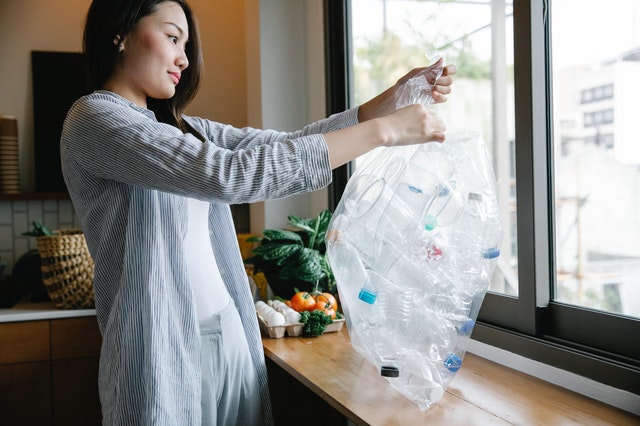In today’s day and age, it is more important than ever to be environmentally conscious. With so many things going on globally, you need to do your best to reduce your carbon footprint as much as possible. This post will provide you with ways that you can make your home eco-friendly and help reduce wastage! You’ll be living a greener life in no time at all!

Zero Waste Bread Bags:
Instead of using plastic bags for your bread, try making a few reusable ones out of fabric. You can find plenty on the internet!
This is an excellent way to slowly reduce waste at home and save on expenses.
Reusable Bowl Covers:
You will never again have to use a plastic bag for your bowl cover! Instead, try making some reusable ones out of fabric or felt. There are so many tutorials online; you’ll be set in no time at all!
Restructure Old Clothes
Put old clothes in a pile and sort them. Throw away any items that are too soiled or torn to repair and recycle the rest of the hangers into usable panels for hanging clothing on wire racks.
Detachable jeans are a fabulous crazy idea for lasting clothing options. Try them out!
Zero Waste Sandwich Covers
A simple and cost-effective way to reduce wastage in the kitchen is by using a zero-waste sandwich cover. A zero-waste sandwich cover is an alternative to plastic wrap or aluminium foil that covers sandwiches, cookies, slices of bread, etc., as it protects your food from bacteria while still allowing them to get crispier than if they were left uncovered.
Reuse Pasta Jars As Drinking Jars
Another way to reduce wastage in the kitchen is by re-using pasta jars as drinking jars. These make for adorable DIY gift ideas or kids’ room decor, and it’s a good idea from both an environmental and cost standpoint.
Use Old T-Shirts As Dusting Rags
T-shirts are one of the most basic and versatile items in a person’s closet, making them perfect for tasks like dusting. Simply cut t-shirt sleeves into rags, and use an old T to clean glass surfaces.
Recycle Grocery Mesh Bags Into Pot Scrubbers
Mesh grocery bags make for great pot scrubbers. Simply cut the bag into strips, and use them to clean dishes with minimal fuss.
Old Newspapers As Trash Liners
Instead of buying bin or trash liners, simply use old newspapers to line your garbage cans. Newspaper is an eco-friendly way to keep the messiness of rubbish from spilling out all over the place and can be composted at home in a worm bin or taken to any recycling centre for proper disposal.
Reuse Napkins As Dish Towels
Napkins make for functional and eco-friendly dish towels. Simply fold them in half to give yourself a hand towel, or cut the napkins into squares and use them as cloths that you can easily clean when dirty.
Reuse Plastic Bottles for Storing Food
Cut off the top of any old water bottle you have lying around and turn it into a food container. These make for great kids’ lunch boxes, as the no-spill design helps to reduce wastage by keeping sandwiches from getting smashed or soggy with water when carrying around in your bag.
Use Old T-Shirts As Dishcloths
If you have any old T’s lying around, just cut them into dishcloths. They’re easy to clean and dry quickly, making them perfect for intermittent use in the kitchen or bathroom and can be easily swapped out when they become too soiled.
Use Old T-Shirts As Produce Bags
Old T-shirts make great reusable grocery bags that also double up as produce wrap – all you need to do is cut the sleeves into long strips and drape them over your vegetables or fruit.
Compost Scraps in Your Refrigerator
You can start composting food scraps in your kitchen by placing a container at the back of the fridge where you store any fruit or vegetable peels, eggshells, coffee grounds, or other scraps that don’t go into the garbage.
Use Your Dish Rack as a Drying Rack for Delicate Fabrics
This is especially helpful if you have tonnes of dishes to dry and few dishcloths, as the raised areas on a dish rack make for perfect spots to hang your fabrics.
Reusable Produce Bags Instead of Plastic Ones
Plastic grocery store sacks are not recyclable and are often difficult to reuse, making it a good idea to swap them out for reusable produce bags. These can be from old t-shirts or even towels and will ensure that your food is fresh in transit while saving you some money on plastic sacks.
Use Cloths Instead of Paper Towels
Replace disposable paper towels with cloths for routine cleanups and use them to dry your hands after washing.
Baking Soda and Vinegar for Cleaning
Baking soda and vinegar are two household items that, when mixed, create a powerful natural cleaner. This is also an easy way to reduce the amount of trash you produce, as this mixture has antimicrobial properties that help kill any bacteria or mould spores on surfaces around your home – perfect when it’s time to deep clean.
Use Old T-Shirts As Clotheslines
An old T makes for a great clothesline. Just cut the sleeves off and hang them from your shower curtain rod, or if you’re feeling extra crafty, make yourself some decorative clips with yarn to hold the shirts in place. This is perfect when it’s time to air out linens and towels, as the clothes will dry quickly in a breezy area.
Reuse Napkins As Dishcloths
Napkins make for great reusable dishcloths. Simply cut them into squares and use these to dry your dishes or clean up any spills around the house – they’ll wipe away all that dirt without ever having to wash them, making it a perfect way to reduce wastefulness in the kitchen!
Reuse Glass Jars As Food Storage
Glass jars don’t require plastic lids or other packaging, making them a great way to store food. With the proper preparation and care, you’ll be able to reuse these for years on end – perfect if you’re looking to reduce your home’s carbon footprint!
Reuse Glass Bottles As Flower Vases
If glass bottles have been sitting around your house for a while, just fill them with water and enjoy the beauty of fresh flowers without having to worry about buying vases. Not only is this environmentally friendly, but it also saves you some money on unnecessary items that will inevitably end up in landfills after one use!
Conclusion
These are just some ways to reduce wastage and contribute to a more sustainable life at home. If there’s one thing that you might have learnt over the years, it’s that reducing waste is easy! All you need to do is adjust your habits to preserve natural resources for future generations. It may take a little while to make these changes, but it’s definitely worth the time.
Featured post
© Copyright 2021 Antonia, All rights Reserved. Written For: Tidylife

Leave a Reply